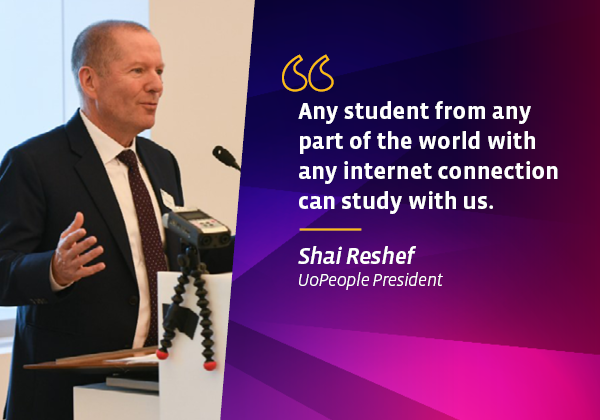Social Media
The University recognizes the utility of social media (social networks, blogs, websites, etc.) to facilitate communication amongst students, faculty, staff, volunteers, alumni and other parties, as well as significantly impact professional and organizational reputations. Given the seminal role that social media plays in UoPeople’s operations, the University has adopted an extensive Social Media Policy, available at the University’s website at https://www.uopeople.edu/tuition-free/uopeople-policies/.
The University of the People encourages a strong virtual community amongst our student body. To this extent, we provide access to class forums, Viva Engage, and our official Facebook page. We recognize that many students utilize additional communication applications that are external to the University (e.g.,WhatsApp, Slack, GroupMe, etc). Although the majority of students will use these platforms in the spirit of study groups, socializing, and sharing their lived experience with others, some might try to encourage academic dishonesty and use the communication tools to pressure others in either giving or receiving information that violates our Code of Academic Integrity (e.g., exam questions, answers to homework, inflating peer assessment marks). Unfortunately, some individuals may also choose to use these platforms to make disparaging comments and threats or to solicit fellow students. Even though these activities may take place in forums that are not officially supported by the university, violations of the code of academic integrity or general code of conduct may result in disciplinary action by the university.If a student witnesses acts that violate the Code of Academic Integrity or General Code of Conduct, they should notify their Program Advisor or another University representative immediately. The University takes such reports seriously and grants the reporter anonymity and confidentiality. By associating with groups instigating academic dishonesty and failing to report prohibited activity, students risk the penalties attributed to breaking the Code of Academic Integrity or General Code of Conduct, which sanctions include failures on assignments, a failure in the course, suspension, or expulsion from the University.
Violations of the Code of Academic Integrity can damage how employers, schools, and other partners view the strength of our degree programs. It benefits all of us to maintain the quality and integrity of our coursework.
Among the principles outlined in the University’s Social Media Policy are the following:
-
- Social media may not be used as a substitute for the University’s usual Human Resources processes, and job postings may not be made online without the express authorization of the UoPeople Human Resources Department.
- The Communications Department shall issue and maintain a set of best practices available to all online ambassadors, staff, students, faculty and UoPeople volunteers who engage in online conversations.
- Students, volunteers, and online ambassadors should never represent themselves as official spokespeople of the University. If a member of the UoPeople faculty or staff identifies himself or herself online as a member of the UoPeople faculty or staff, they shall make it clear that they are not speaking on behalf of UoPeople. All users should provide an open and honest explanation of their role and make it clear that the views expressed are their own, unless they are copying and pasting from a University post or the UoPeople website.
- If a UoPeople faculty member or staff person is offered compensation by a third party to participate in an online forum, advertisement or endorsement, permission must first be granted by the University as this may constitute a conflict of interest.


